Related Research Articles
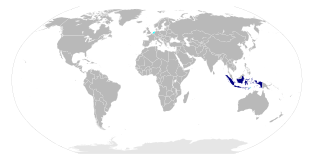
Indonesian is the official and national language of Indonesia. It is a standardized variety of Malay, an Austronesian language that has been used as a lingua franca in the multilingual Indonesian archipelago for centuries. Indonesia is the fourth most populous nation in the world, with over 270 million inhabitants—of which the majority speak Indonesian, which makes it one of the most widely spoken languages in the world.

Sapardi Djoko Damono was an Indonesian poet known for lyrical poems, and who was widely regarded as the pioneer of lyrical poetry in Indonesia. He died in South Tangerang, Banten on 19 July 2020 after a long illness.
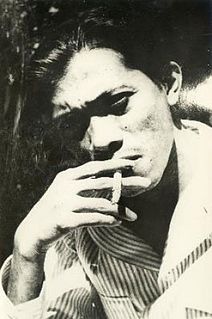
Chairil Anwar was an Indonesian poet and member of the "1945 Generation" of writers. He is estimated to have written 96 works, including 70 individual poems.

Javanese is a Malayo-Polynesian language spoken by the Javanese people from the central and eastern parts of the island of Java, Indonesia. There are also pockets of Javanese speakers on the northern coast of western Java. It is the native language of more than 98 million people.
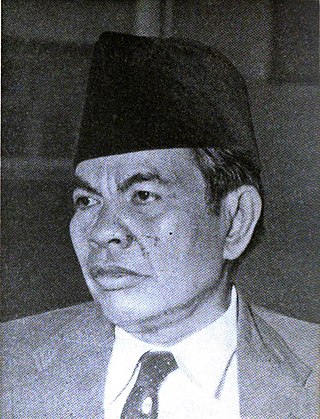
Mohammad Yamin was an Indonesian poet, politician and national hero who played a key role in the writing of the draft preamble to the 1945 constitution.

Indonesian literature is a term grouping various genres of South-East Asian literature.
Poetry Africa is an international poetry festival held annually in Durban, South Africa.

Arifin Chairin Noer was an Indonesian poet, theater director and film producer.

Tengku Amir Hamzah was an Indonesian poet and National Hero of Indonesia. Born into a Malay aristocratic family in the Sultanate of Langkat in North Sumatra, he was educated in both Sumatra and Java. While attending senior high school in Surakarta around 1930, Amir became involved with the nationalist movement and fell in love with a Javanese schoolmate, Ilik Sundari. Even after Amir continued his studies in legal school in Batavia the two remained close, only separating in 1937 when Amir was recalled to Sumatra to marry the sultan's daughter and take on responsibilities of the court. Though unhappy with his marriage, he fulfilled his courtly duties. After Indonesia proclaimed its independence in 1945, he served as the government's representative in Langkat. The following year he was killed in a social revolution led by the PESINDO, and buried in a mass grave.

Roestam Effendi was an Indonesian writer and member of the House of Representatives of the Netherlands. He is known for experimenting with the Malay language in the writing of his drama Bebasari and his poetry collection poetry anthology Pertjikan Permenoengan.
Harry Aveling is an Australian scholar, translator and teacher. He specialises in Indonesian and Malaysian literature, and Translation Studies. He received the degrees of Doctor of Philosophy in Malay Studies from the National University of Singapore and Doctor of Creative Arts (DCA) from the University of Technology, Sydney. Besides his academic writing, he has translated extensively from Indonesian and Malay, from Vietnamese Francophone literature, and also co-translated from Hindi. He has been awarded the Anugerah Pengembangan Sastra for his translation work. Aveling has two sons, a daughter and five granddaughters.

Boenga Roos dari Tjikembang is a 1927 vernacular Malay-language novel written by Kwee Tek Hoay. The seventeen-chapter book follows a plantation manager, Aij Tjeng, who must leave his beloved njai (concubine) Marsiti so that he can be married. Eighteen years later, after Aij Tjeng's daughter Lily dies, her fiancé Bian Koen discovers that Marsiti had a daughter with Aij Tjeng, Roosminah, who greatly resembles Lily. In the end Bian Koen and Roosminah are married.

Indonesian author Amir Hamzah (1911–1946) wrote 50 poems, 18 pieces of lyrical prose, 12 articles, 4 short stories, 3 poetry collections, and 1 book. He also translated 44 poems, 1 piece of lyrical prose, and 1 book. The majority of Amir's original poems are included in his collections Njanji Soenji (1937) and Boeah Rindoe (1941), both first published in the literary magazine Poedjangga Baroe. His translated poems were collected in Setanggi Timoer (1939). In 1962 documentarian HB Jassin compiled all of Amir's remaining works – except the book Sastera Melajoe Lama dan Radja-Radja'nja – as Amir Hamzah: Radja Penjair Pudjangga Baru.
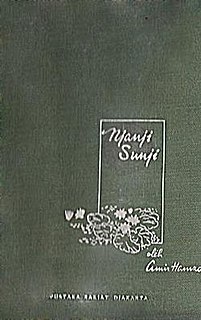
Njanji Soenji is a 1937 poetry collection by Amir Hamzah. Written some time after the poet was forced to marry the daughter of the Sultan of Langkat instead of his chosen love in Java, this collection consists of 24 titled poems and pieces of lyrical prose, none of which are dated. First published in the magazine Poedjangga Baroe, the collection has been republished as a stand-alone book several times.
"Padamoe Djoea" is a 28-line poem by Amir Hamzah which was included in his 1937 collection Nyanyi Sunyi. Hamzah's best-praised work, readings have generally focused on religious themes – mainly from an Islamic perspective, although Christian influences have been suggested.

Boeah Rindoe is a 1941 poetry collection by Amir Hamzah. The poems date to Amir's first years in Java, between 1928 and 1935. According to Anthony Johns of Australia National University, the poems are arranged chronologically, as indicated by Amir's increasing maturity as a writer while developing the poems. The collection includes twenty-three titled poems and two untitled pieces. Ten of the poems had previously been published, including Amir's first published works, "Mabuk..." and "Sunyi".

Drama dari Krakatau is a 1929 vernacular Malay novel written by Kwee Tek Hoay. Inspired by Edward Bulwer-Lytton's 1834 novel The Last Days of Pompeii and the 1883 eruption of Krakatoa, the sixteen-chapter book centres on two families in 1920s Batam that are unknowingly tied together by siblings who were separated in 1883. The brother becomes a political figure, while the sister marries a Baduy priest-king. Ultimately these families are reunited by the wedding of their children, after which the priest sacrifices himself to calm a stirring Krakatoa.
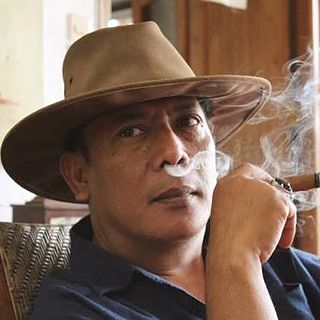
Sitok Srengenge is an Indonesian poet, actor, and dramatist. Born Sitok Sunarto in Purwodadi, Central Java, he became interested in literature at a young age and was heavily influenced by his village's strong oral tradition. When he moved to Jakarta to complete his university studies, he became involved with the Bengkel Teater under Rendra. Sitok remained with the company for almost a decade, appearing in several plays as he refined his literary style. His first poetry collection, Persetubuhan Liar, was published in 1992.

Horison (Horizon) was a monthly literary magazine in Indonesia.
References
- 1 2 3 Agusta, Leon (24 December 2007). "Sutardji Calzoum Bachri: from bottle-poet to Sufism". The Jakarta Post.
- 1 2 3 Jennifer Lindsay, ed. (2003). Babel or behemoth: language trends in Asia. NUS. p. 52. ISBN 978-981-04-9075-1.
- ↑ Hill, Hal (1994). Indonesia's new order: the dynamics of socio-economic transformation. University of Hawaii Press. p. 246. ISBN 978-0-8248-1660-5.
- ↑ "Medy Loekito: silent poetry, lonely poetry". The Jakarta Post. 30 October 2009. Archived from the original on 29 October 2010.
- ↑ Muhammad Haji Salleh (March 1991). "Oral elements in contemporary Indonesian poetry". Indonesia and the Malay World. 19 (54): 3–18. doi:10.1080/03062849108729752.